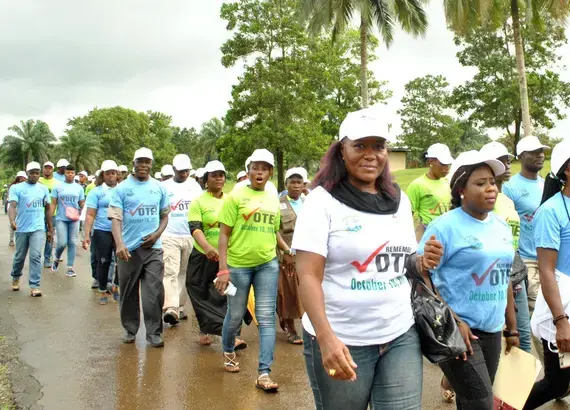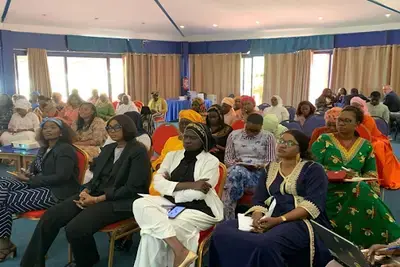
A march in Upper Montserrado to conduct civic and voter education in the runup to Liberia's October 10 elections (photo credit: Adele Ravida)
Success Story
Spotlight on Liberia 2017: Laying the Foundation for Greater Stability, Peace and Sustainable Development
Liberia is in transition, celebrating more than a decade of peace since the end of its civil war in 2003 and surviving the Ebola crisis. The country is moving past a focus on political stability and towards building a resilient democracy that delivers for its people. After electing Africa’s first woman head of state, President Ellen Johnson-Sirleaf, in 2005, Liberians face another historic election on October 10, 2017: the first peaceful transfer of power between two democratically elected governments. Transparent and accountable elections would strengthen Liberia’s nascent democratic institutions and reinforce its status as an emerging democracy in Africa.
Liberia’s presidential election is a highly competitive contest. The campaign season kicked off on July 31, and already, Monrovia is awash with campaign posters, billboards, and convoys. Candidates vying to replace President Sirleaf include her vice president, Joseph Boakai, as well as Senator George Weah, her 2005 election opponent and a former soccer star. Other major candidates include former Coca-Cola executive, Alexander Cummings, running with the Alternative National Congress (ANC); Benoni Urey, former chair of Liberian telecom company, Lonestar, standard-bearer for the All Liberian Party (ALP); prominent attorney Charles Brumskine of the Liberty Party (LP); and former Central Bank of Liberia head, J. Mills Jones of the Movement for Economic Empowerment (MOVEE). All told, 20 presidential candidates have been certified, including just one woman, MacDella Cooper.
In late July, NDI deployed six long-term observers (LTOs) throughout Liberia. The LTO teams have been interviewing election officials, candidates, local party leaders, civil society groups, and other stakeholders in order to assess election preparations and campaign activity on the local level. The observers have visited all fifteen of Liberia’s counties and will continue to travel throughout Liberia through election day and remain in their regions to observe the post-election period. On October 4, they will be joined by an additional group of short-term observers who will deploy to observe polls across the country.
NDI also recently deployed a delegation of high-level observers for a Pre-Election Assessment Mission from September 4-8. Ambassador Johnnie Carson of the United States, Hon. Hanna Tetteh of Ghana, and Dr. Tajoudine Ali-Diabacte of Togo, together with NDI Regional Director Dr. Chris Fomunyoh and Senior Program Manager for Elections Michael McNulty, held meetings with President Sirleaf, the National Elections Commission, presidential candidates, political party leaders and civil society representatives.
The delegation’s key recommendations are as follows (see full statement here):
National Elections Commission
-
Provide the complete Final Registration Roll in machine-readable format to political parties and accredited international and citizen election observers, as a further means of ensuring the integrity of the voters list.
-
Intensify voter education and place urgency on distributing voter education materials to civil society organizations (CSOs), so that they have sufficient time to reach the most remote and vulnerable populations. Prioritize efforts to minimize invalid ballots by working with CSOs to familiarize voters with the voting process including through distributing sample ballot papers.
-
Ensure that election results are transmitted securely from magisterial offices to National Elections Commission (NEC) headquarters and are announced in a timely, transparent manner. Following election day, provide polling-place level results on NEC’s website in a timely manner, as planned.
Security Services
-
Expand the implementation of the Liberian National Police’s community policing approach as a means of building trust between citizens and security services, and maintaining law and order before, during, and after the elections. Maintain professionalism in ensuring peaceful conduct of campaigns while also ensuring the right to freedom of assembly.
Political Parties and Candidates
-
Adhere to the Farmington River Declaration and the Ganta Declaration, which outline specific commitments to peaceful elections, to mitigate conflict among candidates and supporters.
-
Raise awareness of and express zero tolerance for violence against women in the electoral process, including towards female candidates.
Civil Society
-
Provide credible, evidence-based, and timely information that provides an accurate assessment of electoral processes, raises early warnings of potential electoral violence, and, if warranted, verifies or dispels rumors. Monitor and report on violence against women in elections, as well as access of marginalized groups to the voting process.
To bring attention to the upcoming election in Liberia, on September 13, Dr. Fomunyoh participated in a hearing before the U.S. House of Representatives Committee on Foreign Affairs Subcommittee on Africa, Global Health, Global Human Rights and International Organizations. The hearing focused on the Future of Democracy and Governance in Liberia and highlighted the importance of the 2017 election to U.S. policymakers, especially given the presence of Congressman Ed Royce, chairman for the full foreign affairs committee. Subcommittee Chairman Chris Smith and Ranking Member Karen Bass presided over the hearing, and Congressman Dan Donovan, whose Staten Island district is home to the largest Liberian diaspora in the United States, participated as well.
“If properly organized, the upcoming elections would lend legitimacy to the government that emerges, empower legislators to more forcefully exercise proper oversight and better represent constituents, and create new opportunities for citizens to contribute to the consolidation of peace and stability,” said Dr. Fomunyoh during his testimony. “The future of democracy in Liberia will hinge, in the short-term, on the perceived success or failure of the October polls and in the long-term, on the ability of future leaders to consolidate the gains that have been made in the last decade in improving governance and meeting citizen demands.” He concluded, “If voters have confidence that the electoral process is fair and credible and that their collective will is reflected in the outcome, that would lay the foundation for greater stability, peace, and sustainable development.”
The future of democracy in Liberia will hinge, in the short-term, on the perceived success or failure of the October polls and in the long-term, on the ability of future leaders to consolidate the gains that have been made in the last decade in improving governance and meeting citizen demands.
Dr. Chris Fomunyoh, NDI Regional Director, Central and West Africa
NDI began working in Liberia in 1997, when it launched its first voter education and election monitoring program. Following the end of the civil war, NDI returned to Liberia and has continuously worked in the country since 2003. The Institute is currently implementing three programs funded by the United States Agency for International Development (USAID). In addition to its international elections observation mission, NDI is supporting civil society to become more engaged in the electoral process and to provide technical assistance to all interested political parties to conduct party poll-watching and debates prior to the election. NDI previously worked with the Liberian legislature to be a more transparent and citizen-centered body by creating more entry points for citizens, and with civil society to engage in evidence-based issue advocacy and monitor the legislature’s activity. Additional information on NDI’s past and current programming can be found at ndi.org/liberia.



